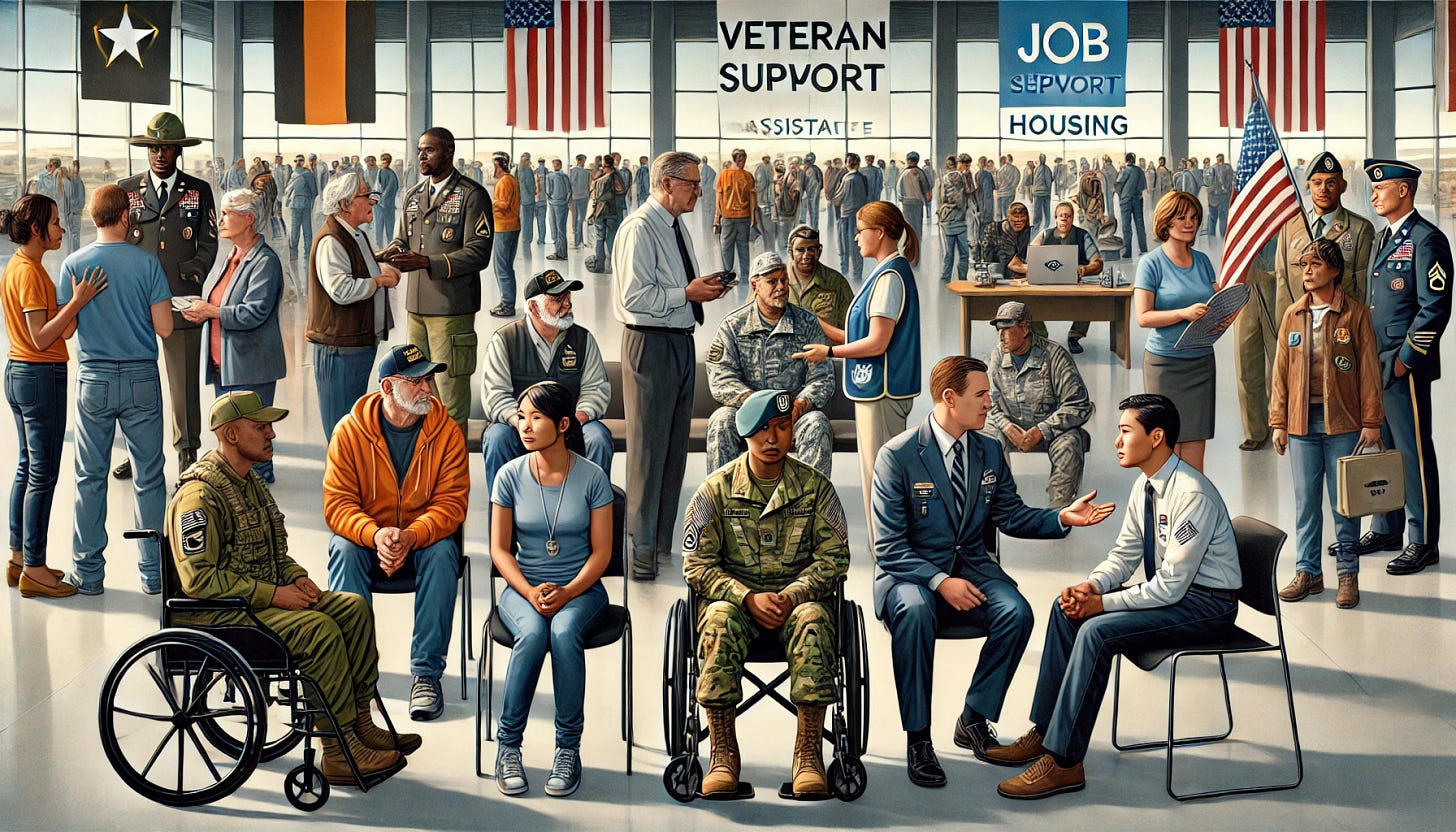🟪Veterans Rights & Services
A ranked guide to advocacy groups supporting U.S. veterans through health care, housing, jobs, and justice
These organizations advocate for policies and programs that serve veterans’ needs and honor their service. They offer tools for civic engagement and action—ranging from grassroots campaigns to direct services and legislative advocacy.
About These Advocacy Group Guides: I’ve created more than 60 issue advocacy guides to help people connect with effective organizations and take meaningful action. If you’re interested in other issues, you can explore them all here: Advocacy Groups by Issue.
A community service organization focused on veterans' benefits, youth programs, and national security, actively engaging citizens to advocate for veterans' rights.
Veterans of Foreign Wars (VFW)
A nonprofit organization dedicated to supporting veterans and their families through advocacy, community service, and assistance with VA claims.
Provides programs and services for injured veterans, focusing on health and wellness, and encourages community engagement through volunteer opportunities.
Offers various services to veterans, including emergency assistance, mental health support, and reintegration programs, while also mobilizing citizen volunteers.
Provides financial assistance and support to military families, focusing on critical needs and community engagement, mobilizing citizen activists to aid veterans.
Vietnam Veterans of America (VVA)
A congressionally chartered organization dedicated to the needs of Vietnam veterans, advocating for their rights and benefits.
The American Veterans (AMVETS)
Advocates for veterans’ rights and benefits across all eras with a focus on community service.
Disabled American Veterans (DAV)
Supports veterans with disabilities providing assistance in accessing benefits and health care.
Iraq and Afghanistan Veterans of America (IAVA)
Focuses on the needs of veterans who served in Iraq and Afghanistan, advocating for policy changes and providing resources for reintegration.
National Veterans Foundation (NVF)
Offers crisis management, information, and referral services to veterans, providing opportunities for citizens to volunteer and support veterans in need.
Government agencies
U.S. Department of Veterans Affairs (VA)
The overarching body responsible for providing comprehensive services to veterans, including health care, benefits, and memorial services. Engaging with the VA can offer opportunities for advocacy and improvement of veteran services.
Veterans Health Administration (VHA)
Part of the U.S. Department of Veterans Affairs, the VHA provides health care services to veterans, focusing on holistic health and wellness.
Veterans Benefits Administration (VBA)
Another branch of the U.S. Department of Veterans Affairs, the VBA administers benefits and services to veterans, ensuring they have access to their entitlements.
Veterans know the costs of war.
Explore today’s organizations working to prevent future wars.
Top Issues Facing Veterans
Mental Health and PTSD: Many veterans suffer from mental health conditions, including PTSD, depression, and anxiety. Activists work to promote awareness, access to mental health services, and reduce the stigma surrounding mental health issues.
Access to Health Care: Veterans often face challenges accessing timely and adequate health care services. Activists advocate for improved health care policies, better VA services, and increased funding for veteran health care initiatives.
Homelessness: A significant number of veterans experience homelessness due to various factors such as mental illness, unemployment, and lack of affordable housing. Activists support initiatives aimed at providing housing solutions and resources for homeless veterans.
Employment and Job Training: Finding stable employment can be challenging for veterans transitioning to civilian life. Advocates push for job training programs, employment resources, and business partnerships to help veterans secure meaningful work.
Benefits and Compensation: Many veterans encounter difficulties navigating the VA benefits system, leading to underutilization of available resources. Activists work to simplify the claims process and ensure veterans receive the benefits to which they are entitled.
Suicide Prevention: The veteran suicide rate is alarming, prompting activists to focus on prevention strategies, awareness campaigns, and support networks to help at-risk veterans.
Substance Abuse: Substance abuse issues can affect veterans, often as a coping mechanism for trauma. Activists advocate for treatment programs, support groups, and resources to address addiction among veterans.
Women Veterans’ Issues: Women veterans face unique challenges, including military sexual trauma and a lack of tailored health care services. Activists work to ensure that women veterans receive appropriate support and recognition.
Transitioning to Civilian Life: The shift from military to civilian life can be difficult for many veterans. Activists support programs that facilitate this transition, including mentorship, networking opportunities, and community integration efforts.
Advocacy for Policy Change: Many organizations and citizen activists focus on advocating for legislative changes that improve the lives of veterans, pushing for comprehensive reforms in areas such as health care, benefits, and veteran rights.


